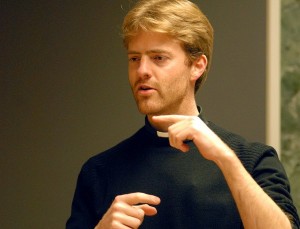Thought of Trying a Technology Fast for Lent?
Sam Hailes
In The Scent of Lemons, Jonah Lynch suggests a 'switch off' fast from social media technology that might help build real friendships.

Social media technology is responsible for the creation of websites such as Facebook and Twitter and alongside it, an entire industry.
It’s been responsible for both job creation (anyone need a ‘social media coordinator’?) and matching employers with employees through sites such as LinkedIn. It's even been responsible for countless romantic assignations and many marriages thanks to the rise of internet dating sites.
So how does social media technology effect real-life relationships? That’s one of many questions Italian seminary rector, Jonah Lynch, asks in his new book The Scent of Lemons.
The title came about during what the author calls a “eureka moment”.
“One morning I was walking outside the room I live and I like to smell the lemons when they are just becoming ripe so I did that one morning. I thought: ‘how nice it would be if my mother could smell this’. That was my eureka moment. That was one thing I couldn’t email to my mum. I started to think about other things that can’t be sent over technology and that brought together a lot of the ideas in the book.”
3000 Facebook Friends
Jonah explains that he isn’t attempting to give a broad ‘yes’ or ‘no’ answer on whether or not people should use technology.
“I’m not trying to take sides. The idea of the book is to show various aspects of technology and its effect on human relationships in the first place, but also other aspects like attention, concentration, memory and so forth, from a neurological point of view.
“Then I broaden the perspective to social contexts. What does technology do to human relationships in general? My goal is to help people think about what they are doing.”
The Irish priest is sceptical of those who claim to be 'friends' with thousands of people.
“There’s this famous Dunbar number - the 150 people which is, more or less, the maximum number a human being can keep in contact with. So what does that mean when you have 3000 Facebook friends?”
Aware that such comments have been made my many others, Jonah is happy to admit the that the onus is on him to explain why another book about technology is needed.
Incarnate

“What do I have to bring to the table? One of the things is my faith. Christianity is an exaltation of the material world. We’re talking about God incarnate. That means there’s something special about the material world and not just the spirit.
“It’s an interesting angle, because a lot of the time we tend to think of the virtual world as a copy or extension of our normal real world. But one of the things I try to underline is that the human person is incarnate. We live in the flesh and you can’t really say that an experience that happens without the flesh is on the same level as an experience that happens in the flesh.
“When I’m chatting with a friend in Gmail chat and something funny comes up I might type ‘hahaha’ and that’s the best I can do. It’s something else to be sitting in the company of friends and having a laugh together.”
At just over 100 pages long, Jonah has aimed to make his book pithy but weighty. He points out that the subject matter is not only interesting but affects all of our lives.
Jonah argues that there are times in life where being connected to technology can “impoverish” our own experience of life.
“I’m not talking about throwing away everything that has an 'on' switch. I’m just talking about being able to decide that there are certain moments where it’s better to not have interruptions from any other source. If you’re telling a joke; and there’s the first brother that does this and there’s the second brother and the third brother... and you’re working up to the climax then someone’s phone rings, that punch line falls flat.
150 people is more or less the maximum number a human being can keep in contact with. So what does that mean when you have 3000 Facebook friends?”
“You can’t recover the tension of the moment if you get an interruption. So a technology 'fast' is just to say there are times and places so dense and concentrated with meaning that they can’t be interrupted, and I want to respect that.”
Technology Fast
A real life example of a place which should be free from interruption is Jonah’s own seminary.
“When the first year students come in, I ask them to spend a year without a cell phone and computer. They can use the phone in the phone room and the computer in the library, so it’s not that I’m asking them to not have any connection with anybody. But it’s a pretty powerful way of saying: 'Let’s focus on what’s essential and learn to pray, study and be with other people and cultivate relationships'.
“For the first two weeks it’s like an alcoholic when you take away their drink; they don’t know what to do with themselves. They want to send messages but they can’t.
“After a short time they get used to that, and relationships here grow very quickly. They get to know each other much more quickly than a few years ago when we didn’t do this.”
Rather than simply creating a ghetto, Jonah’s aim is to challenge students' thinking. It’s for this reason that they are allowed their technology back in the second year. He believes the success comes in teaching people to make conscious decisions about their technology, rather than allowing gadgets to subconsciously influence the individual.
In proposing technology fasts, Jonah’s aim is not to eliminate freedom, but to help people recover it.
A technology fast is just to say there are times and places so dense and concentrated with meaning that they can’t be interrupted and I want to respect that.
Radio took 38 years to reach one million users. TV took 13 years. Facebook added over 200 million users in less than one year.
With statistics like this demonstrating the power and growth of the uncontrollable machine that is social media, it’s no wonder that more and more people are asking the question: “Is it time to switch off?”
Latest Blogs

Bible
What is the New International Version (NIV) Bible?
Finding the right Bible isn’t easy. There are dozens of translations and hundreds of editions to choose from. Our new series of guides is here to answer your questions about the different Bibles on offer today.

Bible
What is the English Standard Version (ESV) Bible?
Finding the right Bible isn’t easy. There are dozens of translations and hundreds of editions to choose from. Our new series of guides is here to answer your questions about the different Bibles on offer today.

Featured
What is the King James Version (KJV) Bible?
Finding the right Bible isn’t easy. There are dozens of translations and hundreds of editions to choose from. Our new series of guides is here to answer your questions about the different Bibles on offer today.

Featured
What is the New Living Translation (NLT) Bible?
Finding the right Bible isn’t easy. There are dozens of translations and hundreds of editions to choose from. Our new series of guides is here to answer your questions about the different Bibles on offer today.

Bible
Choosing The Right Bible
With more than 20 English Language translations each available in 25 or more different editions the choice of Bibles excites and bewilders. Choosing the right Bible for you is important - even if you already have more than one.

Spiritual Growth
LENT COURSES - How to choose the right one for you
Long overshadowed by the celebrations of Easter Sunday, Lent is being rediscovered as a sacred time of reflection and renewal in its own right and a time of preparation for the joyous seasonal finale.
